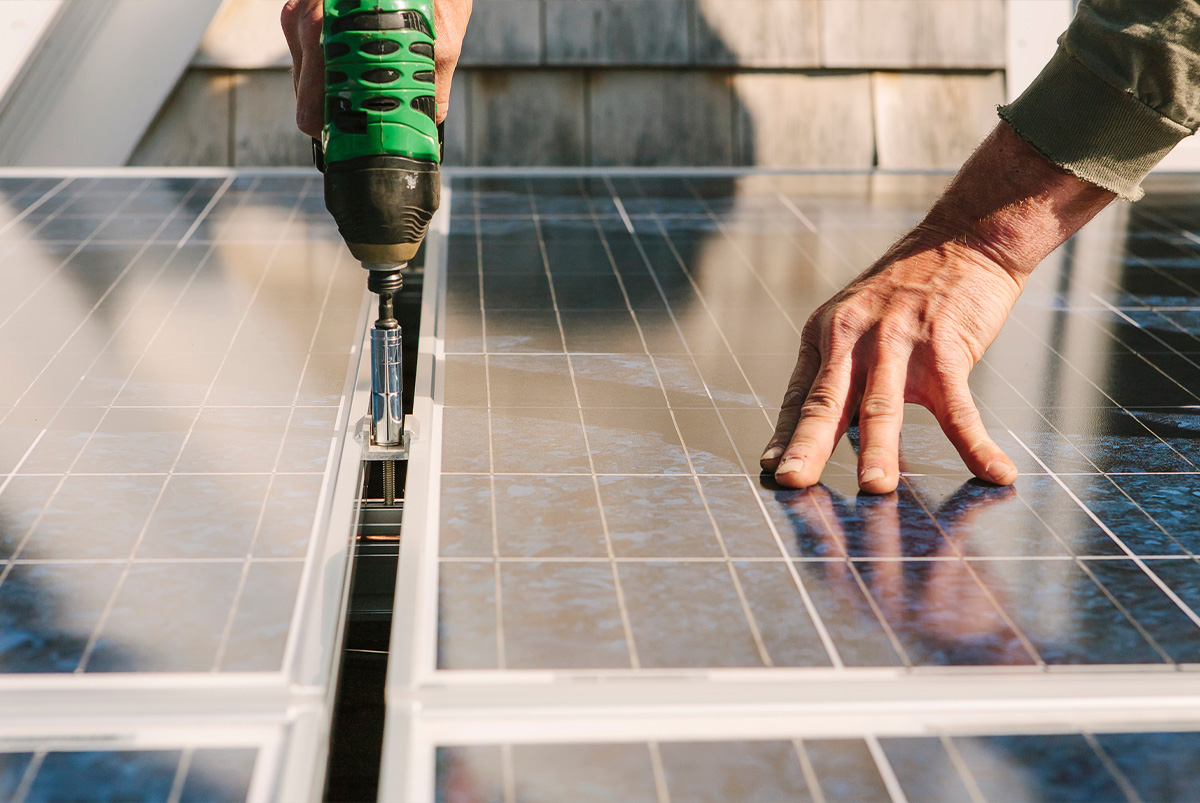Ready To Buy a Home?
Get Approved to Buy a Home
Rocket Mortgage® lets you get to house hunting sooner.
If you made changes to your home in 2023 or are planning to make improvements, you might be able to save on your taxes. Most home improvements aren’t tax deductible, but there are a few exceptions you should know about before tax season comes around.
The rules on home improvements you can write off can be a little complicated – but fear not. We can simplify those rules and help you understand which home improvement projects are eligible for tax deductions in 2023.
Home Improvements vs. Home Repairs
First, let’s explore the difference between home improvements and home repairs.
Home improvements
Sometimes referred to as capital home improvements, home improvements are permanent alterations to a home that increases its value. Common examples of home improvements include:
- Additions
- Decks and porches
- Home systems (HVAC, roof, plumbing and electrical)
- Swimming pools
- Adding a bathroom
- Installing new windows
- Installing insulation
- Finishing a basement or attic
Home repairs
Home repairs restore homes to their working condition. Fixing leaky faucets or patching holes in drywall would qualify as home repairs. Other repairs can include:
- Replacing a broken window
- Refinishing damaged hardwood floors
- Repainting a room
- Fixing a broken cabinet or drawer
- Resealing your driveway
- Replacing broken appliances
- Fixing a broken gutter
Unless you use your home for business, you’ll be hard-pressed to find repairs you can deduct. Otherwise, you can only deduct home repairs you made due to damage caused by natural disasters that aren’t covered in your insurance policy.
Ready to make a change?
Whether you want to buy a house, refinance or take cash out, you’re not alone. The experts are just a click away.
Tax Deductions vs. Tax Credits
Before we discuss which improvements can save you money on your taxes, you should understand the difference between tax deductions and tax credits.
- Tax deductions: Deductions reduce your taxable income. For example, if you earn $100,000 and claim $10,000 in deductions, you’ll be taxed on $90,000.
- Tax credits: Credits reduce your tax bill dollar for dollar. Let’s say you owe $20,000 in taxes and have a $2,000 federal tax credit. The tax credit would reduce your tax bill to $18,000.
Both tax deductions and tax credits can save you money, but dollar for dollar, you’ll save more with tax credits.
Types of Home Improvements That Are Tax Deductible
Tax breaks on home improvements to your principal residence are generally limited to energy-efficient improvements and adaptations for medical care. Let’s talk about the types of home improvements you can claim as deductions on your taxes.
Energy-efficient improvements
The government offers tax credits to homeowners who make qualifying energy-efficient home improvements, such as[1]:
- Solar panels
- Geothermal heat pumps
- Solar water heaters
- Small wind turbines
- Insulation
- Energy-efficient heating and air conditioning systems
- Biomass stoves
- ENERGY STAR®-qualified exterior doors and windows
The Inflation Reduction Act of 2023 will expand tax benefits for homeowners who invest in greener home upgrades, energy systems and electric appliances.[2]
Home improvements for medical purposes
Home improvements for medical purposes are tax deductible once they exceed 7.5% of your adjusted gross income. If your adjusted gross income is $100,000, you can start deducting home improvement expenses after you’ve spent $7,500.[3] If you spend $10,000 on home improvements for medical purposes, you can deduct $2,500.
The IRS allows deductions for anything that helps mitigate, prevent or treat illnesses, including[3]:
- Expanding hallways and doorways
- Lowering kitchen cabinets
- Making entrances and exits accessible
- Installing handrails
- Adding lifts from one floor to another
- Installing support bars in a bathroom
- Modifying fire alarms and smoke detectors
Home improvements to increase resale value
You may pay capital gains tax if you make a profit when you sell your home. To calculate capital gains tax, subtract the basis cost (usually the property’s original purchase price) from the sale price.
You can increase your basis cost by the cost of qualifying home improvements you make, which will lower your capital gains tax bill when you sell. This tax benefit only applies when you sell your home. You can only claim it during the tax year you sell the property.
Home improvements that can increase resale value and are eligible for tax breaks include:
- Building an addition
- Finishing a basement or attic
- Adding a new bedroom or bathroom
- Installing a new furnace
- Adding a swimming pool
- Installing a new heating or central air conditioning system
- Installing a new septic system
- Insulating walls, floors or pipes
Home office improvements
Your home must be your primary residence and have a space(s) you use regularly and exclusively for business to qualify for tax benefits.
If your home office needs repairs, you can deduct the percentage of your home devoted to your business from your repair costs.[5] If your home is 2,000 square feet and your office is 200 square feet, you can deduct 10% of your home improvement costs.
What you spend on permanent improvements to your home-based business will be added to your cost basis, which you’ll benefit from when you sell.[5] You can also deduct your home office’s depreciation (more about that soon).
With the recent shift to remote work, if you work from home, you might be wondering if you can claim a home office deduction on your taxes. During the height of the COVID-19 pandemic, the IRS reiterated that home office tax deductions are only available to self-employed individuals or independent contractors. You’re not eligible for a home office deduction if you receive a W-2 from your employer.[5]
Rental property renovations
The government has a separate set of laws and rules regarding deductible home improvements and repairs on rental properties.
While home improvements on rental properties are not deductible, you can save some money on your taxes by reporting deductible depreciation expenses.[6] Depreciation is calculated over 27.5 years.[7] During that time you can gradually reclaim part of the cost of any improvements.
Unlike repairs on your home, repairs on rental property are tax deductible. And you can claim deductions the year you make the repair(s). You’ll have to report whether the work you’ve done to your rental properties falls under improvements or repairs.
The criteria to separate between the two is a bit fuzzy, but in general, an improvement is work that increases the property’s value or changes the way it’s used. Repairs cover necessary upkeep to maintain the current value and functionality of the property.[8]
Examples of home improvements on rental property include:
- Bathroom renovation
- Kitchen remodel
- Laundry room addition
- Appliance upgrades
- New windows
- New roof
- Security system install
When To Claim Home Improvement Deductions on Your Taxes
Most home improvement tax deductions or credits are taken during the tax year the work is completed. The two exceptions are home improvements for a resale, which can only be claimed when you sell the home, and depreciation deductions, which you claim gradually over time.
How To Maximize Home Improvement Savings
When tax season rolls around, you should try to maximize your home improvement savings. Here are some tips to help you take advantage of eligible deductions.
Save documents
Documentation is key to successful tax savings. Create a folder to save your receipts and any paperwork that documents your home improvements.
Receipts are the easiest way to verify home improvements, but you can also use contracts, written statements from your contractor or before and after photos.
Consult a tax professional
Tax law can be dense – and it’s constantly changing. A tax professional should be up-to-date on tax law and the latest deductions. They can help maximize your tax savings, not to mention saving you the headache of preparing and filing your taxes on your own.
Talk to a real estate professional
An experienced real estate professional can tell you which home improvements offer the best return on investment and which home improvements are trending in your neighborhood. They should have basic knowledge of home improvement projects you can deduct from your taxes.
Renovate, Document, Save
Home improvements can provide valuable opportunities to save on your taxes.
To cut your tax bill, consult a professional or research which improvements may earn you a tax deduction or tax credits. Keep your paperwork documenting any home improvements at the ready in case the IRS needs proof. And remember, you don’t need to battle tax regulations by yourself. Consider recruiting a tax professional for counsel and assistance.
The Short Version
- Tax breaks on home improvements to your principal residence are generally limited to energy-efficient improvements and adaptations for medical care
- Home improvements for medical purposes are tax deductible once they exceed 7.5% of your adjusted gross income
- You’re not eligible for a home office deduction if you receive a W-2 from your employer
Internal Revenue Service. “Energy Incentives for Individuals: Residential Property Updated Questions and Answers.” Retrieved September 2022 from https://www.irs.gov/newsroom/energy-incentives-for-individuals-residential-property-updated-questions-and-answers
The White House. “FACT SHEET: How the Inflation Reduction Act Builds a Better Future for Young Americans.” Retrieved September 2022 from https://www.whitehouse.gov/briefing-room/statements-releases/2022/08/16/fact-sheet-how-the-inflation-reduction-act-builds-a-better-future-for-young-americans/
Internal Revenue Service. “Publication 502.” Retrieved September 2022 from https://www.irs.gov/publications/p502#en_US_2021_publink1000178902
Internal Revenue Service. “Publication 936.” Retrieved September 2022 from https://www.irs.gov/publications/p936#en_US_2021_publink1000229996
Internal Revenue Service. “IRS reminds taxpayers of the home office deduction rules during Small Business Week.” Retrieved September 2022 from https://www.irs.gov/newsroom/irs-reminds-taxpayers-of-the-home-office-deduction-rules-during-small-business-week
Internal Revenue Service. “Tips on Rental Real Estate Income, Deductions and Recordkeeping.” Retrieved September 2022 from https://www.irs.gov/businesses/small-businesses-self-employed/tips-on-rental-real-estate-income-deductions-and-recordkeeping
Internal Revenue Service. “Publication 527.” Retrieved September 2022 from https://www.irs.gov/publications/p527
Internal Revenue Service. “Tangible Property Regulations – Frequently Asked Questions.” Retrieved September 2022 from https://www.irs.gov/businesses/small-businesses-self-employed/tangible-property-final-regulations




